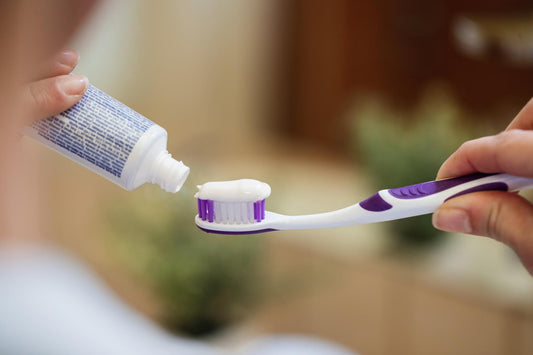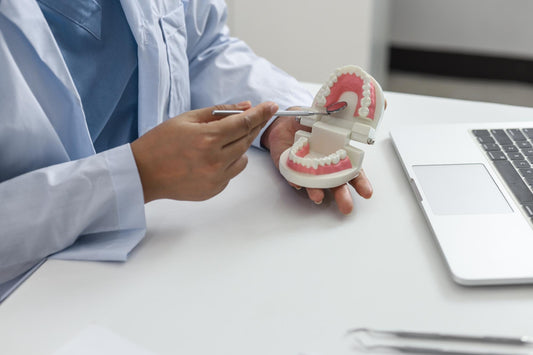How to Maintain Healthy Gums for Life

How to Maintain Healthy Gums for Life - Enzim Singapore
Introduction: Why Daily Care Matters
Your gums are the foundation of your smile. While teeth often get most of the attention, it’s the gum tissue that holds everything in place. Without strong, healthy gums, teeth lose stability, oral health declines, and overall wellbeing can suffer.
Globally, gum disease also known as periodontal disease remains one of the most common health conditions. Many people are unaware that gum disease is caused by harmful bacteria living in dental plaque. Left unchecked, this infection spreads beneath the gumline, causing gum recession, bone loss, and tooth loss.
The good news? With consistent daily care and smart habits, gum disease is largely preventable. Let’s explore the best ways to maintain gum health for life.
1. Brushing Teeth Properly
Why Brushing Matters
The first line of defence against gum disease is simple: brushing teeth. Twice-daily brushing removes plaque before it hardens into tartar.
Technique and Tools
Use a soft-bristled brush and gentle circular motions. Avoid aggressive scrubbing, which can cause gum recession.
Fluoride Toothpaste vs Enzyme-Based Toothpaste
While fluoride toothpaste protects enamel, many commercial pastes use SLS (sodium lauryl sulfate), which can irritate gums. Enzim enzyme-based toothpaste is SLS-free and uses natural enzymes to strengthen saliva’s antibacterial defence ideal for daily gum protection.
2. Flossing and Interdental Cleaning
Flossing for Gum Health
Brushing alone cleans only 60% of tooth surfaces. Flossing removes plaque between teeth, preventing gingival pockets and periodontal pockets.
Interdental Brushes
For larger gaps, interdental brushes are more effective than floss. They reach hidden areas where food debris and oral bacteria thrive.
Prevent Gingivitis
Daily interdental cleaning is one of the most effective ways to prevent gingivitis, the earliest stage of gum disease.
3. Mouthwash and Rinsing
Antimicrobial Mouthwash
Using an antimicrobial mouthwash helps control bacterial growth and freshens breath.
Natural Alternatives
Saltwater rinses can also help reduce inflammation and soothe inflamed gums.
Balanced Approach
Mouthwash should complement, not replace, brushing and flossing.
4. Nutrition for Gum Health
Vitamins and Minerals
Nutrients like Vitamin C, Vitamin D, and calcium are vital for gum tissue repair and resilience. A deficiency in Vitamin C, for example, is linked to bleeding gums when brushing.
Antioxidants and Anti-Inflammatory Foods
Foods rich in antioxidants (berries, leafy greens, green tea) help fight systemic inflammation.
Limiting Sugar
Reducing sugar intake cuts down fuel for harmful oral bacteria, lowering plaque formation.
5. Hydration and Saliva Flow
Why Saliva Protects Gums
Saliva is the mouth’s natural defence. It neutralises acids, washes away debris, and delivers protective enzymes.
Staying Hydrated
Drinking enough water daily maintains saliva flow.
Dry Mouth and Risk
Medications, stress, and ageing reduce saliva. Managing dry mouth is essential to reduce risk of gum infections.
6. Lifestyle Choices
Quit Smoking
Smoking is a leading risk factor for advanced gum disease and slows healing after treatment.
Limit Alcohol
Alcohol dries the mouth, making it easier for bacteria to thrive.
Manage Stress
Chronic stress weakens the immune system, fuelling periodontal inflammation. Stress management techniques from exercise to mindfulness protect not just your mind, but also your gums.
7. Recognising Early Warning Signs
Daily monitoring helps you act before problems escalate.
Gingivitis
Redness, tenderness, and occasional bleeding signal early gum infection.
Swollen Gums and Gum Swelling
Persistent puffiness means bacteria are irritating gum tissue.
Gum Recession and Gingival Recession
Receding gums expose roots and increase sensitivity, an irreversible symptom.
Gum Pockets
Shallow gum pockets may appear early. If untreated, they deepen into periodontal pockets.
Necrotizing Gingivitis
Rarely, severe cases progress into necrotising gingivitis, where gum tissue dies. This requires urgent care from a specialist in gum specialist.
8. Professional Support
Even with excellent daily care, professional help is essential.
Dentist Appointment
Schedule a dentist appointment at least twice a year.
Dental Hygienist and Professional Cleaning
A dental hygienist removes tartar through professional cleaning that brushing and flossing cannot achieve.
Periodontal Probe and Monitoring
Dentists use a periodontal probe to measure pocket depth. Regular tracking ensures gum health remains stable.
Gum Specialist Care
If symptoms progress, a gum specialist may recommend treatments such as scaling, antibiotics, or advanced therapies like LANAP and guided tissue regeneration.
9. Preventing Progression with Treatment
Non-Surgical Treatment
Early-stage gum problems often respond to non-surgical treatment like scaling and root planing.
Advanced Treatment
For attachment loss or bone loss, surgical solutions may be necessary. LANAP and grafting techniques offer modern, less invasive options.
Importance of Maintenance
Even after treatment, consistent home care and follow-ups ensure the disease doesn’t return.
10. Enzim Toothpaste: Everyday Prevention
The best prevention starts at home with the right toothpaste.
Enzim enzyme-based toothpaste is uniquely designed to protect gum health. Its benefits include:
-
Preventing irritation and gingival bleeding
-
Reducing dental plaque buildup
-
Supporting recovery from swelling and gingival recession
-
Helping maintain healthy gums long-term
-
Providing halal-certified, food-grade daily safety
By reinforcing saliva’s natural protective role, Enzim creates an oral environment less favourable to gum infections. Combined with daily brushing, flossing, and lifestyle choices, it forms the backbone of lifelong gum health.
Final Thoughts
So, what causes gum disease? It begins with bacteria, but lifestyle, diet, and habits decide how severe it becomes.
And what does gum disease look like? In its early stages, it appears as slight redness or bleeding. In its advanced form, it looks like gum recession, deep pockets, and unstable teeth.
The secret to avoiding this progression is prevention. By brushing, flossing, eating well, staying hydrated, managing stress, and using Enzim toothpaste daily, you can protect your gums for life.



